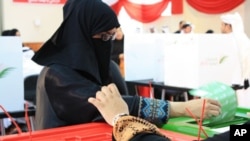Bahrain's main Shi'ite opposition group has won 18 out of 40 seats in the first round of parliamentary elections. The results follow accusations of voter irregularities and mounting tension between the country's ruling Suni and Shi'ite majority.
It is a one-seat increase for the Islamic National Accord Association, also known as al-Wifaq, which gained 17 seats in Bahrain's last election in 2006.
The group claims hundreds of its supporters were prevented from voting this year, but the government denies the accusations. Shi'ites represent 70 percent of Bahrain's population and claim they are treated like second-class citizens.
Before the elections, hundreds of Shi'ite opposition supporters were arrested, including 23 activists who were charged with terrorism and planning to overthrow the government. Authorities say the arrests were not connected to the election.
But the crackdown drew strong criticism from human-rights organizations that say Bahrain could be regressing to all-out authoritarianism.
Brookings Doha Center Director of Research Shadi Hamid says there is no doubt the country is witnessing a change.
"Bahrain was considered one of the more promising democratic experiments in the region. It seemed to be making progress on a variety of indicators and people were very impressed with the reform vision of the king. But just in the last couple of months, what we have seen is almost a complete reversal and I think it has been striking for analysts, including myself, to see how sudden this shift in regime policy has occurred," said Hamid.
King Hamad bin Isa al-Khalifa, who is pro-Western, brought sweeping political reforms to Bahrain after coming into power in 1999. In addition to creating a new parliament, which has limited policy-making abilities, he released all political prisoners and gave women the right to vote.
At the time, Amnesty International said the reforms represented a "historical period of human rights." But, Hamid says it will be a while before the country receives similar praise.
"We are entering into a new phase in Bahrain's political evolution. And some people would like to think that maybe after these elections things would cool down and the king and the government will return to the path of reform, but I do not think that is likely. You cannot undo the last few months. You cannot start from scratch again. Confidence has been lost. It will take a long time for Bahrain to get over this internal conflict and to move beyond what has happened," said Hamid
Bahrain Transparency Society President Abdul Alekry says this year's parliamentary elections have underlined Bahrain's internal tensions, especially when compared to the previous elections.
"There was no tension in the atmosphere [during the last elections] and things were easier for everything. This year, the opposition organizations are being tarnished by the media, which some suppose are pro-government and this in not helpful. The whole process ... the campaign is not as at ease as it was in 2006," says Alekry.
The electoral commission estimates voter turnout was "at least 67 percent".
The second round of the parliamentary elections will be on October 30. Nine seats will be contested.




